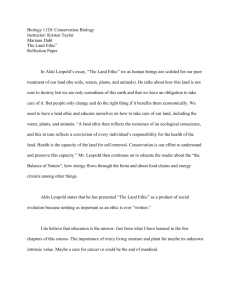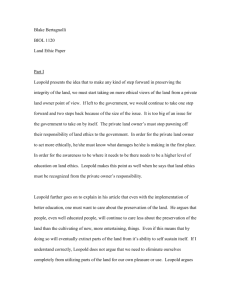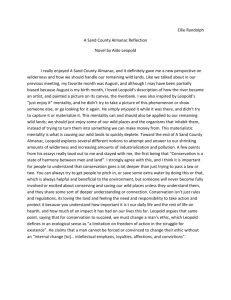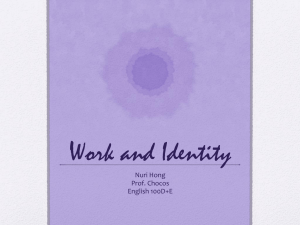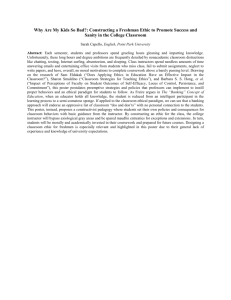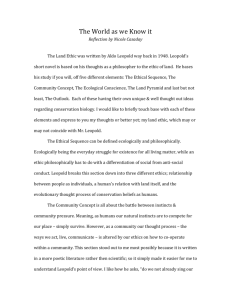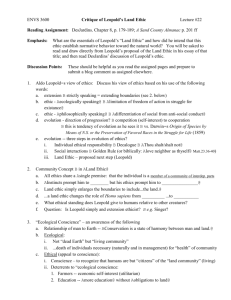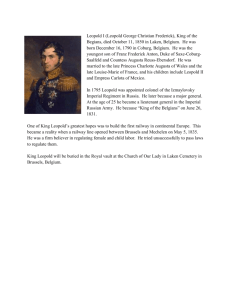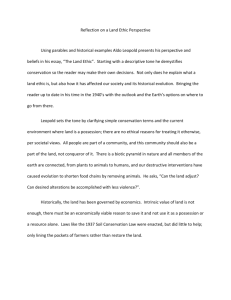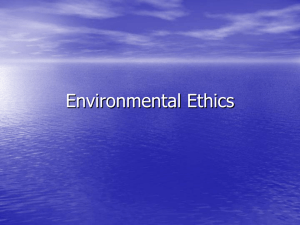Land Ethic Summary
advertisement
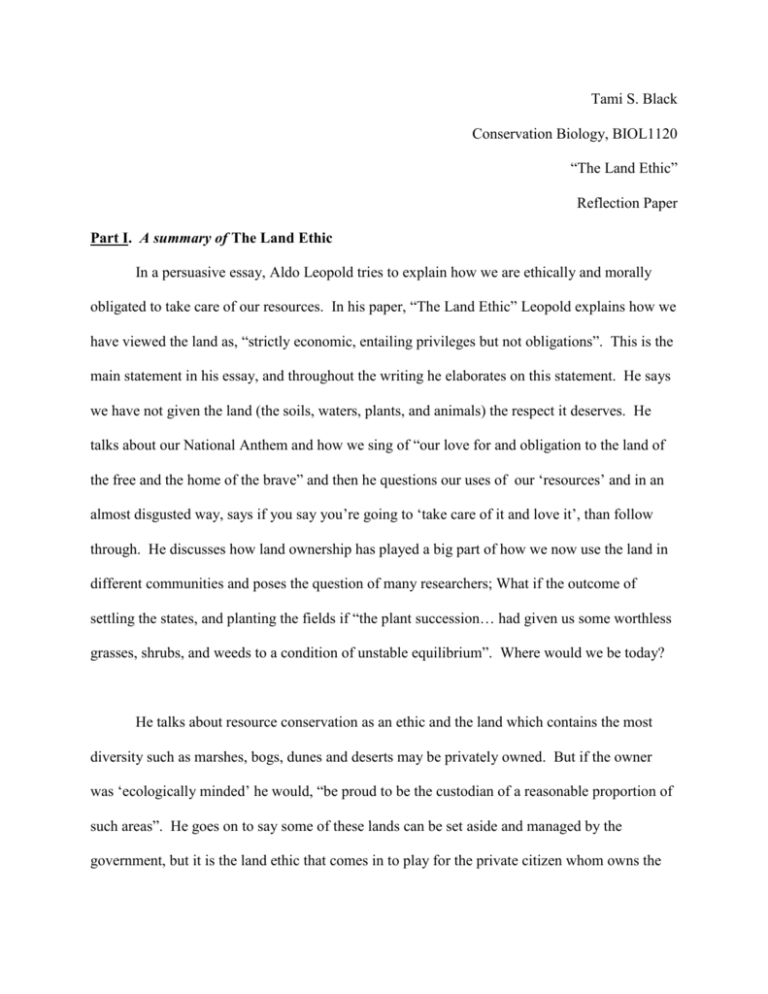
Tami S. Black Conservation Biology, BIOL1120 “The Land Ethic” Reflection Paper Part I. A summary of The Land Ethic In a persuasive essay, Aldo Leopold tries to explain how we are ethically and morally obligated to take care of our resources. In his paper, “The Land Ethic” Leopold explains how we have viewed the land as, “strictly economic, entailing privileges but not obligations”. This is the main statement in his essay, and throughout the writing he elaborates on this statement. He says we have not given the land (the soils, waters, plants, and animals) the respect it deserves. He talks about our National Anthem and how we sing of “our love for and obligation to the land of the free and the home of the brave” and then he questions our uses of our ‘resources’ and in an almost disgusted way, says if you say you’re going to ‘take care of it and love it’, than follow through. He discusses how land ownership has played a big part of how we now use the land in different communities and poses the question of many researchers; What if the outcome of settling the states, and planting the fields if “the plant succession… had given us some worthless grasses, shrubs, and weeds to a condition of unstable equilibrium”. Where would we be today? He talks about resource conservation as an ethic and the land which contains the most diversity such as marshes, bogs, dunes and deserts may be privately owned. But if the owner was ‘ecologically minded’ he would, “be proud to be the custodian of a reasonable proportion of such areas”. He goes on to say some of these lands can be set aside and managed by the government, but it is the land ethic that comes in to play for the private citizen whom owns the biologically rich land. He includes the land as part of the community, and talks about how we should act respectfully to it as part of our community, rather than treat it as just a tract of land with not intrinsic value. Part II. Questions. How would you characterize your own conservation philosophy? How did you come to hold these beliefs? My own conservation philosophy is a blend. I believe partly as John Muir put it (First American Conservationist), that nature has intrinsic value. It has value apart from its value to humanity. I don’t believe nature was created to be destroyed, nor was it created for human’s use and purpose only. It is here for our use, but that we should not use it up. It only makes sense to leave the earth a better place, when we leave it. My motto has always been, “The earth was not given to us by our parents, but lent to us by our children” (Kenyan Proverb). My conservation beliefs stem from when I was a child. My Father, raised on a Native American reservation in Idaho during the summers of his youth, has instilled in us, beliefs and values that he learned from his Grandparents on the reservation. The principals are strikingly similar to those of the Kuna culture in Panama (Essentials of Conservation Biology, R.B. Primack [from our text]). For example, I too believe that we must take care of the land and all living things, as well as live in a harmonious manner with them. I agree that the extinction of one thing can also be the extinction of another. But most importantly, I believe that all life is intertwined in a web, and a sudden disturbance in the balance of this web is felt far and wide. Everything has a purpose and it is not up to us to determine if it should cease to exist. 2|Page Consider this statement: “A land ethic changes the role of humans from conqueror of the land community to plain members and citizens of it. It implies respect for his fellow-members, and also respect for the community as such.” How would you apply this ethic in practice? When I think of ethics, I think of moral philosophy and what is right. One must use respect when dealing with others in the community. In practice, it is simple: Treat others with respect; that is the same respect that you would like to be given, or in this case – respect the land and it will provide. Leopold wrote in the 1940’s, “The land-relation is still strictly economic, entailing privileges but not obligations.” What would you say is our land-relation today? I believe that our land-relation today has changed from that of Leopold’s day. For example, we now offer a Conservation Biology course in schools. This is a sign of the times and I believe more people are concerned about the land and how we use it and take care of it, than did in his day. I believe it could be considered more an educated, economic-perspective with privileges and we are now more aware of the obligations. There are more people today that weigh heavy on the obligations of land ethics, than there were in the 1940’s. I believe, if he were alive today to see the impact that he, along with other conservationists have made; Leopold would be pleasantly surprised. Leopold says the land ethic is extending a community’s sensibilities to all members of the community, nonhuman as well as human. What would that mean in your life or community? I agree with the Leopold’s statement concerning land ethic needing to extend a community’s sensibilities to all members of the community, nonhuman as well as human. Human is obviously you and I, but the nonhuman parts of our community would be the soils, waters, plants, and animals, or as he collectively put it: the land. I respect not only my 3|Page neighbors, and my friends in my community but I also respect my garden, my trees, the neighbors trees and gardens etc. (you get the idea). I believe I have a slight case of biophilia. Everything is alive and should be treated as such, with dignity and respect. As Leopold put it, they are part of my community. As my Father says, it all comes from the Earth and someday, it will all return to the earth. Do you agree with this passage from the “Land Ethic”: “A thing is right when it tends to preserve the integrity, stability, and beauty of the biotic community. It is wrong when it tends otherwise.” Was Leopold suggesting that the integrity of the biotic community supersedes the concerns for its individual members? What are the implications of this concept for you? I completely agree with the statement that, “A thing is right when it tends to preserve the integrity, stability, and beauty of the biotic community. It is wrong when it tends otherwise.” Leopold was suggesting that the integrity of a biotic community supersedes the concerns for its individual members. For example, a key species such as the wolf in Yellowstone National Park preserved the integrity and stability of the biotic community and when it was no longer at a natural population size (that is its numbers were not what they should be had they not had human intervention) the stability of the park was at stake and we did not know this was the issue until we had seen the full recovery of the packs. In the “Land Ethic,” Leopold said, “It is inconceivable to me that an ethical relationship [with land] can exist without love, respect, admiration, and a high regard for its value.” Which is more motivating for you: beauty (aesthetics) or duty (ethics)? In the “Land Ethic,” Leopold said, “It is inconceivable to me that an ethical relationship [with land] can exist without love, respect, admiration, and a high regard for its value.” Most importantly, my motivation is my ethics. My reason for deciding this is because with the right amount of respect for the land the aesthetics will come. There are some things, such as a black 4|Page widow in a web for example – some may find it repulsive and want to kill it on sight. I on the other hand, find beauty in it, I enjoy watching it and out of my ethical duty would permit it to live where someone who’s motivation is beauty, might not find it so beautiful. A better example might be an earthworm in the dirt. Many might not find it so beautiful, and therefore their motivation null, but I, in my love of nature know that the earthworm and the dirt soil have a beautiful relationship, and the soil might not be as productive if it were not for the earthworm. In my ethical motivation, I would not kill the earthworm, because it was not beautiful – but let it alone so that it may provide aeration for the soil. In thinking about your “land ethic,” does it emanate primarily from self interest, or from a true interest in non-human elements? My “land ethic” emanates primarily from a true interest in non-human elements. As explained earlier in my essay, I believe that everything has a purpose on this earth and we are not here to determine what continues to survive. It is true, I do have some self interest in my land ethic, but that is only because I want to ensure that what we have today on this blue planet is here for future generations to enjoy. Part III. Critique. The Land Ethic was a useful exercise. I had knew of it, heard quotes from it all through my career, but not once had I read it. Reading it did not change my opinions however. I believe that I have a strong opinion of where and how I fit in the web of life, and my beliefs are well developed and strong. I have a newfound respect for Aldo Leopold himself after reading his Land Ethic paper. He was a very smart man, and he was sadly before his time. If more people read this piece, I feel they would see the world in a different light. I thoroughly enjoyed reading 5|Page the piece and would recommend it to others. My favorite quote, “A thing is right when it tends to preserve the integrity, stability, and beauty of the biotic community. It is wrong when it tends otherwise.” 6|Page

